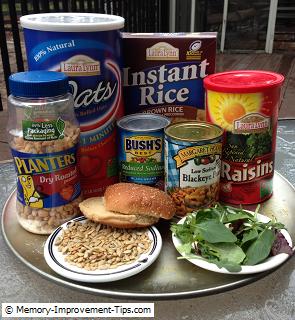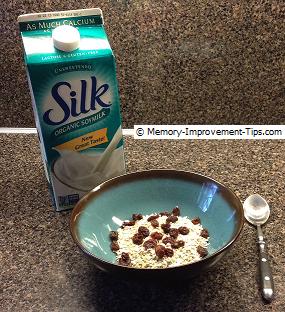- Home
- Better Memory
- Diet and Memory
- Foods High in Magnesium
Eat Foods High in Magnesium to Boost Memory and Fight Disease
To boost your brain power and lower your risk of serious disease, eat foods high in magnesium. That's the lesson of recent studies on the health benefits of magnesium foods.
Scientists estimate that half the people in industrialized countries aren't consuming enough of this essential mineral. Millions are at higher risk of memory loss, heart attack, diabetes, and other serious disorders. Make sure you're not one of them!
Along with other brain foods, eat magnesium-rich foods so your brain and body can function optimally and fight disease. Below I've provided a list of common foods high in magnesium. Eat from this list whenever possible.
And, for an extra brain boost, consider taking the newly discovered magnesium supplement Magtein ("magnesium L-threonate", or MgT). Researchers claim Magtein can directly improve brain performance including memory.
Unlike other magnesium compounds, Magtein easily crosses the blood-brain barrier and affects the brain directly. Magtein is available as an over-the-counter vitamin (see below, and see also my Vitamins for Memory list).
List of Magnesium-Rich Foods
But first things first; before taking magnesium vitamins, start by increasing your intake of magnesium naturally by consuming more high-magnesium foods. In the section below is a list of foods very high in magnesium, and you should consider eating more of these foods on a regular basis.
Foods with the most magnesium tend to be dark-green, leafy vegetables; unrefined grains; legumes; and nuts and seeds. According to the U.S. Food & Drug Administration (FDA), individuals over the age of 14 should consume about 300-400 milligrams (mg) of magnesium per day.
1. Dark-green leafy vegetables, especially spinach, are a rich source of magnesium. A half cup of frozen, cooked spinach contains 78mg of magnesium, about 20% the daily recommended amount.
2. Unrefined grains are high-magnesium foods. Foods made from refined white-flour are poor sources because magnesium is removed during processing. The following are good sources of magnesium from whole grains:
Bran Flakes Cereal (¾ cup has 64mg of magnesium)
Brown Rice, cooked (½ cup has 42mg)
Oatmeal, instant, prepared with water (1 cup has 61mg)
Wheat Germ (¼ cup has 69mg)
Whole Wheat Bread (1 slice has 23mg)
3. Legumes, which include beans and peas, are an excellent source of magnesium:
Black Beans, cooked (½ cup has 60mg of magnesium)
Black-Eye Peas, cooked (½ cup has 46mg)
Kidney Beans, cooked (½ cup has 35mg)
Lentils, cooked (½ cup has 36mg)
Peanuts, dry roasted (1 ounce has 50mg). Most people don't realize that peanuts are legumes, not nuts, by the way. I wrote an article about that in the 1990's that was published in my local newspaper. Not many people read it, I guess.

Pinto Beans, cooked (½ cup has 43mg)
Soybeans, cooked (½ cup has 74mg). As an alternative to cooked soybeans, add soy milk to your coffee or cereal, or snack on soy nuts.
4. Tree Nuts are high in magnesium:
Almonds, dry roasted (1 ounce has 80mg of magnesium)
Cashews, dry roasted (1 ounce has 74mg)
Mixed Nuts, dry roasted (1 ounce has 64mg)
Pine Nuts, dry roasted (1 ounce has 71mg)
Walnuts (1 ounce has 45mg)
Other foods high in magnesium include avocados, bananas, dates, halibut (a type of fish), dried herbs such as coriander and chives, and raisins. Sunflower seeds, flax seeds, and sesame seeds are also magnesium-rich foods.
Source: U.S. Department of Agriculture (USDA) Nutrient Database
Easy Ways to Boost Dietary Magnesium
To increase the magnesium in your diet, add items from the magnesium foods list above to meals you already eat, or modify your existing meals.
For example, here are ways I've increased the magnesium in my own diet:
For breakfast, eat oatmeal or high-bran cereal. Sprinkle with wheat-germ, sliced bananas, and/or raisins.
During the day, snack on magnesium-rich foods like dried edamame (a type of soybean) and mixed nuts.
Add unsweetened soy milk to your coffee, instead of regular milk or creamer.
Prepare high-magnesium "trail mix", for when you're on the go. Combine peanuts, tree nuts, dried edamame, banana chips, soy nuts, sunflower seeds, and raisins in a sealable Ziplock plastic bag or container.
At dinner, include a spinach side-salad with your evening meal. Use raw spinach or a spinach-greens mixture as the base. Dress the salad with pinto beans, nuts, and sunflower seeds.
With creativity and preparation it's not difficult to increase your dietary magnesium. It's worth the effort, since the health of your brain and body may depend on it!
Brain & Body Health Benefits of Magnesium
At this point you may be thinking, "Okay, what are the amazing health benefits of magnesium, exactly?"
1. Enhanced Learning & Memory; Protection from Age-Related Memory Loss. A 2010 study published in the journal Neuron revealed a startling fact: increasing magnesium in the brain can lead to direct improvements in learning and memory.1
According to researchers, cognitive performance can be enhanced through supplementation with magnesium L-threonate (MgT), also called Magtein, a newly invented compound of magnesium able to cross the blood-brain barrier.
Dr. Guonsong Liu. who led the study, summed up the findings:
We found that increased brain magnesium enhanced many different forms of learning and memory... Our findings suggest that elevating brain magnesium content via increasing magnesium intake might be a useful new strategy to enhance cognitive abilities.
Magnesium streamlines communication between neurons. It facilitates "synaptic plasticity" where two neurons meet. This plasticity, or ability to be modified when stimulated by new input, enables learning and memory to occur.
Conversely, individuals who don't get enough magnesium by eating foods high in magnesium or taking a magnesium supplement are at increased risk of memory loss as they grow older. Those with adequate levels of magnesium are more likely to enjoy heightened powers of intellect and memory throughout life.2
Previous forms of magnesium vitamins, such as magnesium citrate, are unable to cross the blood-brain barrier easily. Because they wanted to study the effects of magnesium brain concentration, Dr. Liu's group was forced to invent magnesium L-threonate.
Sold under the trade name Magtein, you can buy it in vitamin form without a prescription from Amazon.com, Vitacost, Swanson Vitamins, and elsewhere.
2. Disease Prevention; Migraine Relief. Eating foods high in magnesium is smart for reasons of general health, too. Studies reveal that adequate dietary magnesium can:
Decrease hypertension (high blood pressure)3
Lower stroke risk4
Fight osteoporosis (bone loss), by helping absorption of calcium5
Lessen diabetes risk, by aiding carbohydrate metabolism6
Reduce severity of migraine headaches7
Note: If you suffer from migraine headaches, look into peppermint essential oil as well. According to WebMD, peppermint oil applied to the skin can help relieve tension headaches and migraines.
Considering the many benefits of magnesium, eating more of the foods high in magnesium truly is a no-brainer (pun intended).
And it's exciting that a new form of magnesium vitamin is available with the potential to directly boost cognitive function including memory. No doubt scientists refine the effectiveness of Magtein over time.
Magnesium is good for your brain and good for your body. If you're not getting enough of this essential mineral, eat more often from the magnesium-rich foods list!
And for a potential boost to your learning and memory, consider taking Magtein, the only magnesium vitamin able to cross directly into the brain.
Note: Before making changes to your diet, always consult your doctor about your specific health situation as needed.
[+] References for Foods High in Magnesium
Published: 03/03/2013
Last Updated: 06/11/2020

Newest / Popular
Multiplayer
Board Games
Card & Tile
Concentration
Math / Memory
Puzzles A-M
Puzzles N-Z
Time Mgmt
Word Games
- Retro Flash -
Also:
Bubble Pop
• Solitaire
• Tetris
Checkers
• Mahjong Tiles
•Typing
No sign-up or log-in needed. Just go to a game page and start playing! ![]()
Free Printable Puzzles:
Sudoku • Crosswords • Word Search










